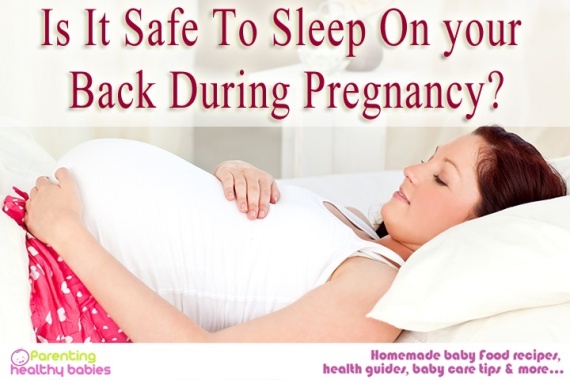Several women find pregnancy challenging for several reasons. Sleep and finding the right position to sleep in are actual challenges women lose sleep over right through their pregnancies, especially in the last trimester. Lying on your back might seem comfortable but did you know that this could adversely affect your baby? Is sleeping on your back a good thing or bad for you and your baby? Let’s find out.
What happens when you sleep on your back?
Though this is really an innocent thing to do for pregnant women, yet it can bring about problems as you reach your latter stage of pregnancy. In this position, the weight of the growing uterus and the baby press on the mother’s inferior vena cava, the vein that transports deoxygenated blood to your heart from the lower body. When this happens, the blood to the heart slows down in pace, thereby reducing the blood flow to the baby, thus he receives less nutrients and oxygen.
Risks
According to a study reported in the British Medical Journal, there is a link between the mother’s sleep position and stillborn babies. Pregnant women who slept on their backs or on their right had twice the risk of having stillborn babies, as compared with those women who slept on their left sides. The risks of this, though small, point women to sleep on their left sides as far as possible for safety’s sake.
How do your sleeping positions affect your baby?
Though not in the beginning of your pregnancy but as it advances, sleep may come to you at a premium. Your large stomach might make it very uncomfortable for you to sleep well or you might wake up feeling sudden spasms of pain. Inevitably, your sleeping position not only affects you but your baby’s growing health too. You can’t possibly sleep at an awkward angle one night as it might cause problems for your baby, but so also you can’t sleep on your stomach or right side alone as this will elevate your chances of a miscarriage.
Let’s take a close look at how women should sleep during their three trimesters:
First Trimester
You might find it convenient and comfortable to sleep on your stomach in the early days of your pregnancy. However, as your pregnancy advances, this will become detrimental to your baby’s growth and development, plus you will feel growing discomfort being in this position. Overall, in your first trimester, you don’t have to worry about your sleeping position.
Second Trimester
As you enter your second trimester, experts suggest that you stop sleeping on your back but move over to sleeping on either one side. This is because you get a growing back ache due to sleeping on your back. Sleeping in this position could also cause you to suffer from respiratory problems, problems with digestion and low blood pressure, and possibly hemorrhoids too.
Heartburn is another reason why you shouldn’t sleep on your back. In this trimester, the uterus enlarges and the diaphragm is narrowed, making breathing difficult and the oesophagus and intestines are out of joint causing reflux and heartburn when you sleep on your back.
Third Trimester
Doctors don’t advocate pregnant women in their third trimesters to sleep on their backs. In this trimester, you obviously are large, so when you sleep on your back, your uterus which is heavy now, can limit the blood flow to the uterus and your growing foetus. You won’t find sleeping on your back comfortable now, in any case, so it’s best to sleep on your side. In this position, your foetus grows better and is in excellent health. Also, the blood flow to the placenta reduces because the uterus’ weight compacts the inferior vena cava. Of both sides, the left side is a better choice as the uterus rotates to the right side during pregnancy while sleeping on the left centers it more and enhances blood flow.
Tips for comfortable sleeping:
- When you sleep on your side, tuck a pillow between your knees or against your back. This will give you good support.
- For extra support, tuck a pillow below your stomach too.
- If you experience heartburn, sleep in a sitting position or use a recliner.
Conclusion
You might experience a lot of discomfort as the days draw near to your delivery. This could severely impact your sleep, but speak to your doctor for advice on how to get to your right sleeping position.
